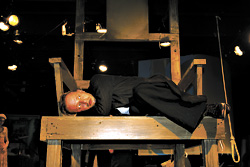“Capitol Hill is under siege,” says Stephen McCandless, managing director of Annex Theatre. We’re standing on the stage of Annex’s new home, the former Northwest Actors Studio (NWAS) at 11th and Pike, examining the ceiling of the theater space. His attention is focused on the ceiling because, with a grant from 4 Culture, Annex is installing sound baffling to cut down on noise—since the floor above is soon to be renovated into a loft apartment by the landlord. “Apparently, if you buy a loft apartment on Capitol Hill for a half-million, you want a nice, quiet bedroom community near downtown,” he says.
Deep in the throes of Capitol Hill’s new gentrification, theater, the hyperactive stepchild of the arts, can be a hard sell. Theaters make more noise, put up more advertising, and draw larger (and rowdier) crowds than restaurants or quiet alternative businesses like boutiques or health spas. True, a theater isn’t a nightclub, and it doesn’t usually attract people who’ll indulge in a fistfight or throw up in your Dumpster (unless it’s a really, really good show), but despite efforts from the city’s Office of Arts & Cultural Affairs and other arts advocates, live performance doesn’t seem to fit the condo developer’s dream of the New Seattle.
So it’s a welcome surprise that two new theater venues have been established on the Pike/Pine corridor in the past three months. The first is Annex, a venerable fringe company that took over the main floor of the shabby and dark interior of the old NWAS back in July. Landlord Anne Michaelson is a longtime arts supporter who’s happy to have a theater group in her building—as long as they pay rent on a more regular basis than NWAS managed. Annex now has a five-year lease, after spending the past five years without a fixed address.
The second group is Balagan, an upstart fringe outfit that’s scored a wonderful new venue in the basement of a new condo building just across the street. Both Annex and Balagan are part of a diaspora from the Capitol Hill Arts Center up on 12th, whose tenants have complained of disorganization, and which often programmed theater on the same nights that live or DJ’ed music was blasting in the next room.
The young hopefuls of Balagan scarcely seem to know what an amazing space they’ve found—30,000 square feet, 10-foot-high ceilings, and easy access to shared bathrooms in a brand-new building. Their landlords, Dunn & Hobbes, “wanted something like a yoga studio or recording studio in here, something artsy and active,” says Balagan’s managing director, Jake Groshong. But his business plan and the guarantees of some generous angels (Groshong is also a professional fund-raiser) guaranteed a three-year lease.
To someone unfamiliar with fringe theater, the space doesn’t look very impressive—it’s a large, featureless concrete box with the atmosphere of a parking garage. But to the group, who’d seen more than 30 venues prior to finding this one, it had one great advantage: “There was nothing wrong with it,” says Balagan company member Ryan Higgins. It required no major demolition, just a lot of black paint, some curtains, and the installation of theater seats donated by Unexpected Productions. Two weeks later, they were open for business. The company plans to add a lighting grid, a new sound system, and walls between the house and the dressing rooms.
The members of Annex also have big plans, hoping to transform an adequate theater that’s a bit like a bowling alley into a fully functional and adjustable classic black box. Unlike Balagan, Annex includes artists who’ve devoted a decade-plus to the arts, and already they’ve managed some impressive changes to the venue, giving the lobby a face-lift and cleaning up the building’s wiring.
Two new fringe theaters are an unlikely bulwark against the unstoppable march of condos up the Pike/Pine corridor. But to see these two groups do all this work without the help of funders or even major capital campaigns is heartening. Hopefully, now that they’ve built it, donors, grants, and, most important, audiences will come.








